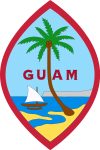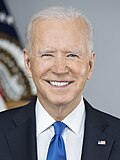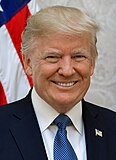2020 United States presidential straw poll in Guam
| |||||||||||||||||||||||
Non-binding preference poll | |||||||||||||||||||||||
|---|---|---|---|---|---|---|---|---|---|---|---|---|---|---|---|---|---|---|---|---|---|---|---|
| |||||||||||||||||||||||
 Results by village
Biden 50–60%
60–70% | |||||||||||||||||||||||
| Elections in Guam |
|---|
 |
The 2020 United States presidential straw poll in Guam was held on November 3, 2020. Guam is a territory and not a state. Thus, it is ineligible to elect members of the Electoral College, who would then in turn cast direct electoral votes for president and for vice president. To draw attention to this fact, the territory conducts a non-binding presidential straw poll during the general election as if they did elect members to the Electoral College.[1]
The territory still participated in the U.S. presidential caucuses and primaries like the other states and territories.[2]
Democratic Party nominee Joe Biden won the poll with 55% of the vote.
Results
Though the votes of Guam residents do not count in the November general election, the territory nonetheless conducts a presidential straw poll to gauge islanders' preference for president every election year. The poll has been held in Guam during every presidential election since 1980.[1]
| Party | Candidate | Votes | % | ±% | |
|---|---|---|---|---|---|
| Democratic | Joe Biden Kamala Harris |
14,610 | 55.38 | ||
| Republican | Donald Trump Mike Pence |
11,058 | 41.91 | ||
| Green | Howie Hawkins Angela Walker |
185 | 0.70 | n/a | |
| Libertarian | Jo Jorgensen Spike Cohen |
169 | 0.64 | n/a | |
| Progressive | Dario Hunter Dawn Neptune Adams |
140 | 0.53 | n/a | |
| American Solidarity | Brian Carroll Amar Patel |
138 | 0.52 | n/a | |
| Prohibition | Phil Collins Billy Joe Parker |
83 | 0.31 | n/a | |
| Total votes | 26,383 | 100.00 | |||
See also
References
- ^ a b "Guam Legislature Moves General Election Presidential Vote to the September Primary". Ballot-Access.org. July 10, 2008. Retrieved February 19, 2020.
- ^ Murriel, Maria (November 1, 2016). "Millions of Americans can't vote for president because of where they live". PRI.
- ^ "Summary Results Report". November 23, 2020.

